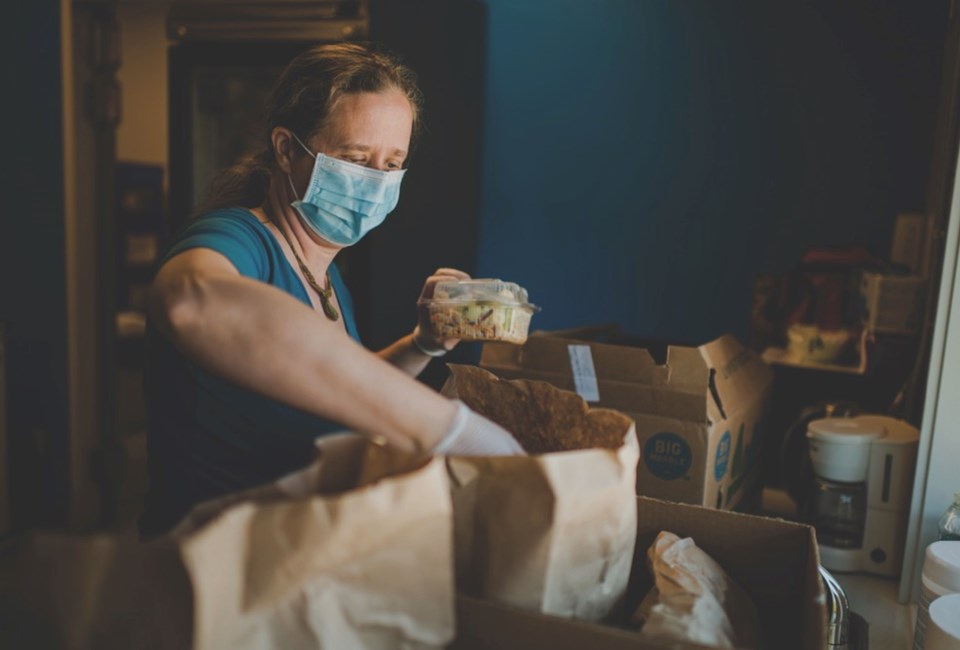Early on in the pandemic, an older member of Whistler’s community fell ill and required hospitalization in Vancouver. As Whistler Community Services Society’s (WCSS) executive director Jackie Dickinson recounted during the organization’s Annual General Meeting (AGM) on Wednesday, June 23, that individual contracted COVID-19 during that time, and sadly, did not survive.
“He never made it back up to Whistler, but his story, his legacy, and everything that he represented lived on through all the people at Whistler Community Services,” Dickinson said.
“The only reason I figured this out was because I met his wife. She was clearing out all of his stuff. They no longer lived together, but they were life partners. She took all of the food out of his pantry, and she donated it to our food bank. She took all of the clothes out of his closet, and she donated them to the Re-Use-It Centre. She took all of his furniture, and she donated it to the Re-Build-It.”
While the man never returned home to Whistler, numerous WCSS departments accepted the responsibility of paying these remnants of a life well lived forward, Dickinson continued.
“Someone else wore his shirt and never knew what that meant, but to us it’s up-cycling, repurposing, and creating new opportunities. His food that he didn’t come back to eat, fed someone else,” she said. “So many of these stories go untold … it’s just one of many examples of how Whistler Community Services is able to support, uplift, create, and learn from our community.”
While those intangible impacts were among the most frequently discussed topics at WCSS’ AGM, the occasion also served as an opportunity to share the organization’s measurable impacts over the last year.
Held in a hybrid format, WCSS staff and board members gathered in person in a space donated by the Fairmont Chateau Whistler while other stakeholders and residents tuned in via Zoom to discuss how the organization has fared since the pandemic began.
The statistics show that in a year defined by isolation, closed businesses and general uncertainty, locals came to depend on WCSS more than ever. They also demonstrated how the community rallied behind the organization like never before, explained Steve Aikins, WCSS board of directors’ vice-chair.
“During this crisis, revenue for our stores [the Re-Use-It and Re-Build-It centres]—we had to shut down for three months and then run at only partial capacity because of COVID—were decimated,” Aikins said. “But with the overwhelming support of the community, organizations and governments, WCSS revenue was at its highest level ever, allowing us to dramatically increase our services—obviously the food bank, outreach—in order to meet our community’s needs, which we did.”
In facing an unprecedented demand for its services, WCSS saw an increase to its costs during the COVID-19 pandemic, according to the figures published in its annual report and statement of financial position, released ahead of the meeting.
With volunteer programs reduced, wages and benefits payable rose to $133,843 from $93,129 in 2019-20, while program costs climbed to $1,251,090 from $924,856. Office and general administration expenses also more than doubled, from $4,878 to $10,731
However, the organization’s excess of revenue over expenses for the 2020-21 fiscal year came to $582,474, compared to $197,513 in 2019-20.
That positive statistic is directly attributable to a spike in donations and grants. Though thrift store revenue dropped to $1,376,420 in 2020-21 from $1,672,400 the year before, WCSS pulled in $1,692,880 in donations and grants compared to $628,002 in 2019-20.
The events of 2020 also prompted the organization to develop several new initiatives. Those include the creation of Whistler’s first-ever Food Security Fund—which currently rests at $250,374—an electronic Community Assistance Program, so people could get access to technology and learn about their health status, the formation of a standing committee responsible for considering diversity, equity and inclusion throughout the organization, and the Food Bank’s new home-delivery program that began in late fall 2020.
It provided 50 deliveries from when it began until the New Year, and is projected to make approximately 750 deliveries in 2021. Also in response to the pandemic, WCSS implemented a temporary isolation program that provided 368 room nights of accommodations to help residents safely isolate from January 2021 to May 2021.
“A person’s experience in January getting COVID was drastically different than what it looked like in November,” Dickinson told AGM attendees. “That’s what it means to have Whistler Community Services in this community. We delivered food in full HAZMAT suits and visors and facemasks. We had staff walk up hundreds of stairs to deliver people food.”
Existing programs that also experienced a massive uptick included the Food Bank itself, where visits were up 87 per cent in 2020 over 2019, from 3,005 visits to 5,642. The Food Bank is expected to see 6,300 visits in 2021.
WCSS Outreach Services, meanwhile, saw a 52 per cent uptick in 2020. The organization logged 3,233 visits in 2019 for one-on-one or group sessions for mental and emotional wellbeing and peer support, compared to 4,922 in 2020. That number is projected to reach 6,000 visits in 2021.
Additionally, WCSS’ School Lunch Program is projected to provide 82,000 servings in 2021, compared to 12,159 in 2020.
For more details, or to read WCSS’ Annual Report, Impact Report or financial statements, visit WCSS.org.




crop.png;w=120;h=80;mode=crop)